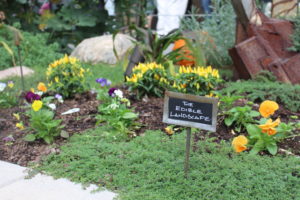Dollars & Sense: Do You Have True Grit?
Usually, garden centers try to get rid of grit. However, true grit, as demonstrated in the 1969 John Wayne movie of the same name, is what separates failed operations from those that continue on and flourish.
“Every business that’s 25 years old or more has had a black period,” argues Eddie Klaben, a successful retailer now retired in Dayton, Ohio. “It’s not something to be ashamed of. It’s something to learn from and grow through.”
During every cycle of business retraction, we hear about garden centers, growers and florists closing up shop. It’s part of Darwin’s theory: the strong change, grow and survive while the weak perish. But another wise man named George Santayana said, “Those who forget history are condemned to repeat it.” So what can we learn from the lessons of our history?
Don’t Be Afraid
First, most people are still afraid to talk about troubling situations or financial distress. In fact, people are often more comfortable talking to strangers about personal problems than to trusted advisors about money issues. It’s as if financial distress is an illness that carries a burden of shame. Money trouble is a very common part of a business’ growth, yet I find very few garden centers that would publicly talk about financial challenges.
One reason for this reticence stems from a fear of credit managers. Owners think, “If my suppliers know I’m having financial distress, they won’t ship to me any more, will restrict the shipment amount or reduce my billing terms,” all of which can start a chain reaction of negative consequences. There is a fine line here between a temporary cash-flow hiccup that causes you to miss one payment and a systemic cash-flow crisis that isn’t going away.
If you look at those who are in “crisis mode,” the first thing you hear is denial: “We can work through this if the company has more sales or better terms from suppliers or a better economy or, or, or… ” Here’s a general rule: Any businessperson who thinks his or her problem can be solved with “If the company just had… ” is in serious denial. I’ve never seen a situation where one thing, no matter how unrealistic, would solve a company’s problems. If only life could be that simple! A company in crisis got into that position because of a number of variables, and it will take a number of changes to get the company where it wants to be.
Your Attitude Matters
Do you know the difference between the survivors and those that don’t make it? You rarely read this in textbooks or see it in financial statistics. In my experience, survivors fall into two camps: those with access to heaps of cash and those with true grit. Neither one of these is a guarantee of success having both is better, but nothing is certain.
Having heaps of cash can help hide mistakes and give breathing room to correct prior mistakes. As the “dot-bomb” era proved, heaps of cash too often create lethargy and lack of financial focus. Scarce resources require that people make better decisions. The owner’s and manager’s attitudes their true grit coupled with an optimistic view of the future is a company’s most valuable long-term resource. Unlike cash, such attitudes don’t dissipate and don’t get spent.
Let’s focus on two true-grit people with positive attitudes who have survived financial dips in their companies’ histories.
True Grit In Life
The first person, who asked not to be identified (I’ll call him the Boss), had worked for years in the industry and finally launched his own garden center. “Sure business is tough, and tough times just make it harder. But when we get over one hump or another, I can see the sun shining. It’s wonderful to see from this perspective,” he said.
I wanted to know how he avoided burnout and kept going during those dark periods. He told me, “I bought the business because I wanted to be in this industry. The support of industry friends was outstanding. You really know who your friends are and who you thought were your friends. People who believed in me friends, peers, suppliers, family they kept me going. I can truly say there wasn’t a single morning I didn’t want to get out of bed and get to work.”
The Boss has true grit with a positive attitude: You may have to face some mega-corporation credit manager with minimal sympathy for your situation, but you still jump out of bed at dawn to fix your business and make it better.
The Boss gave credit to his “support group,” emphasizing the importance of peer support. He has many close friends in OFA An Association of Floriculture Profes-sionals, a buying group and numerous other organizations. He’s made trips to several garden centers (sometimes as part of a tour, sometimes just on his own), and he has the welcome mat out at his place for visiting garden centers. “Once you stop learning and changing, you stop. Period,” he counseled.
One of the things the Boss quickly learned is that every person must carry his or her own weight. There aren’t any extra positions or superfluous jobs. For instance, he told me about a wonderful long-term employee who was a garden center manager. It wasn’t working out, and the Boss was consumed with how to handle this loyal but ineffective team member. Eventually, he let the employee go as a store manager and rehired him as a supervisor. The new job fit the man perfectly, and now everyone is happy and effective. This was one of the problems that got the Boss out of bed early to fix, and he did it brilliantly.
True Grit Through Adversity
You may have heard me say, “Bad days for management have been cancelled!” True grit exemplifies this, and Kenny Rabalais of The Plant Gallery, New Orleans, La., is the poster boy.
How would 9 ft. of salt water for three weeks impact your garden center? For Rabalais, “It was a learning experience.” In July 2005, he had 65 employees working a full city block of garden center, landscaping, interior plantscaping, florist and design products. As of August 2006, the first anniversary of Hurricane Katrina, Rabalais’ staff was back to 55 employees.
His attitude never wavered. Like most New Orleans businesses, he had insurance. He could have taken the money and run to higher ground, but he didn’t. “I love New Orleans; it’s a great place to raise my family. I don’t turn my back on people who are down. I love the business, and as soon as we could get back here, we did. It wasn’t easy. At times it wasn’t fun. Today we’re back to having fun,” said Rabalais.
He offered sage advice on having fun and success in business: “Find the parts of the business you enjoy. Immerse yourself in the areas that are fun for you, and delegate the other parts to people who are good at them. Focus on your strong points, stay engaged and get people who complement your weak points.”
How did he retain his positive attitude and optimism? What’s the source of his true grit? “You need to pick your battles, fight them and move on,” he explained. As of press time, Rabalais has a lawsuit pending against his insurance company, but that’s not an all-consuming affair for him. “It will come out however it does. In the meantime, I have to focus on what recharges me, what drives the business. I can’t stress over things that in the long term aren’t important. So many business owners or managers burn out because they didn’t pick what was important: They worry, fuss or stress over every little thing. Save your energy for the big things.”
Whether your picture is rosy or you’re facing challenges, your team needs true grit leadership, which comes from you. It may be trite, but it has been proven time and time again to be a critical aspect of success. If you don’t think you can, you won’t.
Congratulations to the Boss, Rabalais and all of you who are surviving, changing, adapting and growing through difficult times. You have proved it can be done. It may not be easy, and sometimes it is not a lot of fun, but as the Boss said, “The view from the top is amazing.”


















 Videos
Videos





